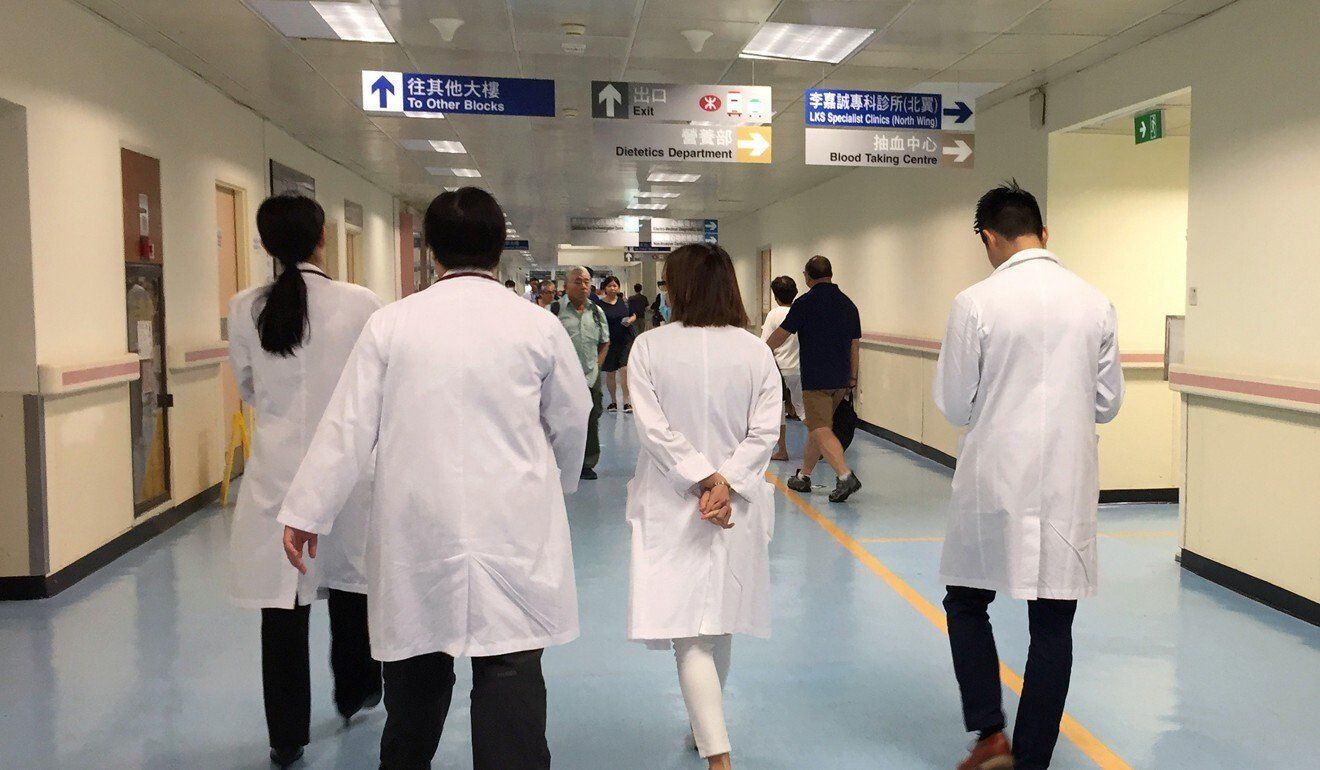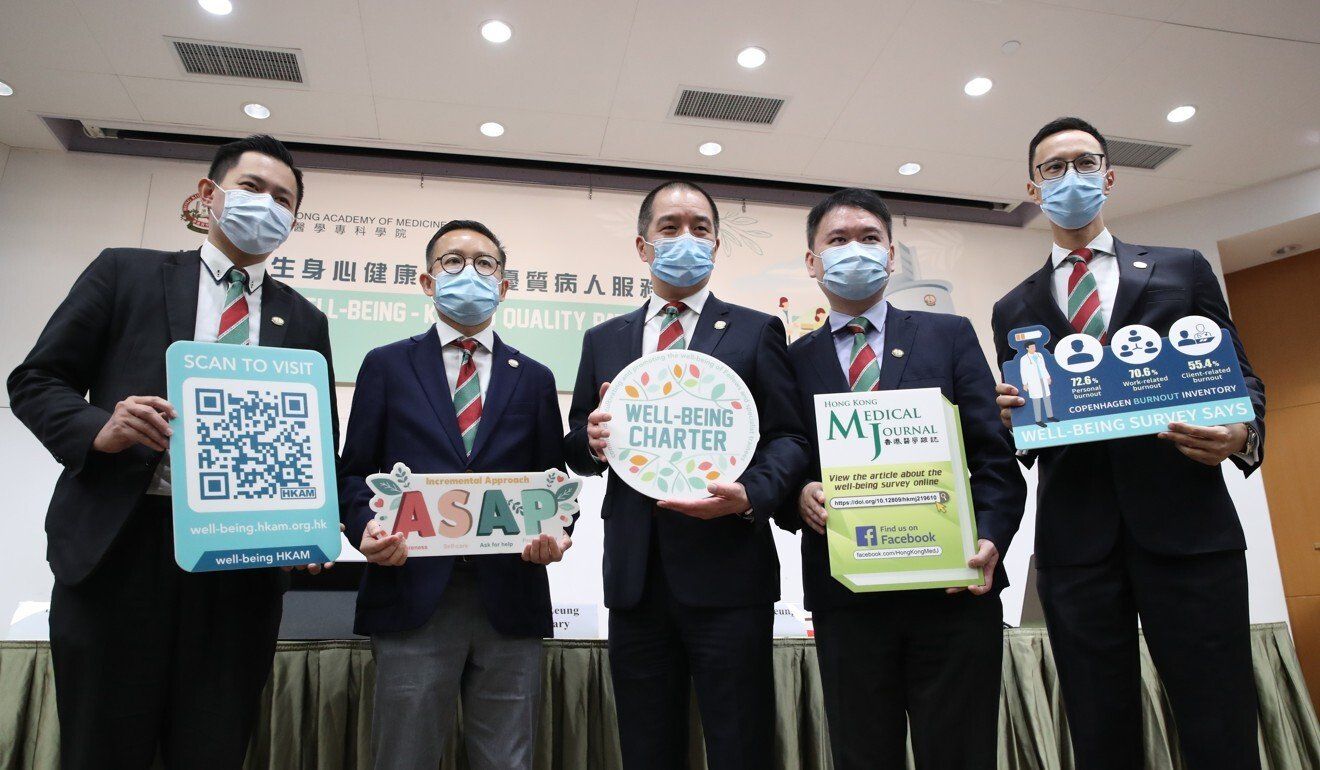Hong Kong News

Over 70 per cent of young doctors in Hong Kong suffer from burnout: survey
More than 70 per cent of young doctors in Hong Kong suffer from work-related burnout while one-fifth have depression, a survey by the city’s medical specialist training institution has found.
The Hong Kong Academy of Medicine published the findings in the Hong Kong Medical Journal on Tuesday.
The survey, conducted between February and June 2019, involved 514 young doctors – defined as those who had completed specialist registration within the past 10 years and residents in training. About 8.6 per cent of the respondents worked in the private sector.
Respondents were asked to fill in an online questionnaire and their answers were assessed by the academy according to an international benchmark gauging the mental health of employees in general.
 Burnout among doctors could result in emotional exhaustion, according to Dr Kenny Kwan, who led the survey.
Burnout among doctors could result in emotional exhaustion, according to Dr Kenny Kwan, who led the survey.
Results showed that about 72 per cent of respondents experienced personal burnout, while 70.6 per cent reported work-related fatigue, and 21 per cent suffered from moderate to severe depression, which was higher than the 8.4 per cent among the general population in Hong Kong in a previous study.
Some also reported suicide attempts, while the most commonly cited source of stress was clinical responsibilities and job demands.
“The mental health of doctors is not only affected by events that happened in a single day. We believe that it could be [affected] by personal factors and long-term structural problems such as the nature of the work of doctors and their relationships with patients,” Professor Gilberto Leung Ka-kit, president of the academy, said.
The time it took to analyse the data collected and the disruption wrought by the coronavirus pandemic had resulted in the delayed release of the survey results, he added.
Dr Kenny Kwan Yat-hong, who led the survey, said burnout among doctors could result in emotional exhaustion, low sense of personal accomplishment and feelings of cynicism, and detachment from the job.
The survey showed respondents worked 53.5 hours on average per week, although some had put in up to 70 hours. They did not engage in much regular physical activity, and the mean duration of sleep each night was about six hours.
“The number of working hours per week was positively associated with depression … The association with suicide attempts only happened to doctors who have children, [so] we cannot see a significant association in the other doctors,” he said.
Asked whether the findings would be different in light of the pandemic and the recent migration wave, Leung said it was to early to comment.
 Dr Jeremy Teoh (far left), alongside Dr Leung Wing-cheong, Professor
Gilberto Leung, Professor Martin Wong and Dr Kenny Kwan at a press
conference on the release of the survey results on Tuesday.
Dr Jeremy Teoh (far left), alongside Dr Leung Wing-cheong, Professor
Gilberto Leung, Professor Martin Wong and Dr Kenny Kwan at a press
conference on the release of the survey results on Tuesday.
The well-being of doctors had a huge impact on the health care system, Leung said, adding that their work had become more complicated given the advances in medicine, and increase in patients’ medical knowledge and expectations.
“We understand that doctors are experiencing quite a lot of stress at work,” he said.
The Hospital Authority was devoted to improving the doctors’ working environment and retaining talent, but Leung stressed that the measures might not have an immediate effect.
Welcoming foreign-trained doctors to work in the city could help alleviate the burden on local practitioners, he said, adding that increasing manpower would be “good for the health care system if they could collaborate and communicate well with our existing colleagues”.
The academy will also form a task force to boost social networks among young doctors in a bid to improve their well-being and reduce the risk of burnout.
“If we can help our colleagues, we can also help our patients at the same time. This is because it would greatly affect the effectiveness of treatment,” Dr Leung Wing-cheong, the task force’s chairman, said.
“We hope the doctors will understand that they are not only doctors, sometimes they may need help as well.”
Dr Tony Ling Siu-chi, president of the Hong Kong Public Doctors’ Association, said he acknowledged the effort of the academy to improve doctors’ well-being, but apart from the introduction of self-help platforms, identification of doctor burnout should be considered an integral part of training assessment for specialist resident trainees, and for staff development reviews at the Hospital Authority.
Health authorities have long warned of the staffing shortage, predicting a shortfall of 1,610 doctors by the end of the decade, rising to 1,949 by 2040.
The shortage could be worsened by an exodus of Hongkongers from across the wider society. Nearly 90,000 residents have left the city in the past year, latest census data showed, leading to a 1.2 per cent drop in the city’s population.
Officials have stressed multiple aspects to be considered, such as people going abroad for work or studies, with inflow limited by stringent border control and Covid-19 quarantine rules.
Health authorities had recently proposed further relaxing a hiring scheme aimed at tackling the shortage, potentially opening the door for more foreign-trained specialists to work in the industry.











